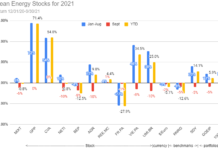Garvin Jabusch
The Occupy Wall Street movement (OWS), now in its fourth week, is getting a lot of media attention. Opinions are divided. By and large, conservatives represent the protesters as ‘a mob’ (a notable exception is former governor of Louisiana and current GOP presidential candidate Buddy Roemer, who said on MSNBC that “politicians need to listen to these young people, it could change America”). Meanwhile, progressives view them as a justifiable, if not inevitable, reaction to the social inequity that results from a system rigged in favor of the ultra-wealthy.

And, of course, that is the true state of affairs in America. These “kids” are absolutely right. The U.S. has always been to some degree subject to the overreach of its richest citizens and, from time to time, the resulting inequity has become so egregious that the less-moneyed have taken to various acts of protest to register their indignation and to work for change. And in case you weren’t aware, inequity is presently at an all-time high in this country. Nobel Prize-winning economist Joseph E. Stiglitz summed it up last May, in his seminal Vanity Fair piece “Of the 1%, by the 1%, for the 1%”:
The upper 1 percent of Americans are now taking in nearly a quarter of the nation’s income every year. In terms of wealth rather than income, the top 1 percent control 40 percent. Their lot in life has improved considerably. Twenty-five years ago, the corresponding figures were 12 percent and 33 percent. One response might be to celebrate the ingenuity and drive that brought good fortune to these people, and to contend that a rising tide lifts all boats. That response would be misguided. While the top 1 percent have seen their incomes rise 18 percent over the past decade, those in the middle have actually seen their incomes fall. For men with only high-school degrees, the decline has been precipitous12 percent in the last quarter-century alone. All the growth in recent decadesand morehas gone to those at the top. In terms of income equality, America lags behind any country in the old, ossified Europe that President George W. Bush used to deride. Among our closest counterparts are Russia with its oligarchs and Iran. While many of the old centers of inequality in Latin America, such as Brazil, have been striving in recent years, rather successfully, to improve the plight of the poor and reduce gaps in income, America has allowed inequality to grow.
In their Declaration, the Occupy Wall Street protestors have rightly placed the blame for all of this on “corporations” (I would amend this to “some corporations with the aid of their bought congresspersons,” and I bet most of the OWSers wouldn’t disagree) and included a long list of grievances against them. For me, three of the charges are especially relevant.
1. “They determine economic policy, despite the catastrophic failures their policies have produced and continue to produce,”
Corporations do determine economic policy, mostly via their nearly complete control of policymakers. Leading economists believe that “skyrocketing inequality… is the result of public policies that have concentrated and amplified the effects of the economic transformation and directed its gains exclusively toward the wealthy. Since the late 1970s, a number of important policy changes have tilted the economic playing field toward the rich.” The catastrophic failures, as in 1929, speak for themselves.
2. “They have donated large sums of money to politicians, who are responsible for regulating them.”
This one, of course, was immeasurably exacerbated by the Supreme Court’s 5-4 ruling, in Citizens United v. Federal Election Commission, that money is speech and therefore may be used as freely, and also that corporations are people, and therefore may exercise their right of free speech (cash) without limit. Further, via super-PACs and 501(c)(4)s, donations of any size can be made and spent anonymously. (I’ve been thinking that Green Alpha should run for governor of Colorado to see whether our company would, in fact, be definable as a “person.”)
It’s not-quite-amusing to note that former House majority leader Tom DeLay was this year sentenced to three years in a Texas prison for making large corporate donations that would today be legal. Citizens United gave corporations whatever remaining leash they needed to make sure Congress stays bought. An amount like $10 million, for example, is relatively small in the world of business (on a good day that buys maybe a small condo complex?) but in Congress it’s enough to ensure the votes of every policymaker you need to make sure that, say, Big Oil gets billion-dollar subsidies or that coal companies can continue to remove whole mountaintops and poison West Virginia. Which brings me to my next point.
Using the levers derived from these actions and policies,
3. “They continue to block alternate forms of energy to keep us dependent on oil.”
Here again, of course the OWS Declaration is right. How else to explain that a majority of the comfortably profitable public solar companies that we follow are presently trading at valuations less than the free cash they have in the bank?
How else can we explain that the main story around energy corruption in America is focused on the relatively small amount of money loaned to solar firm Solyndra? Pure political donation-driven kabuki. Or as Jeff Goodell put it in Rolling Stone:
…we’re in the middle of a concerted campaign to demonize clean-tech entrepreneurs, one that fits into the grand narrative that fossil fuel apologists and shills have been pushing for several decades now: that America as we know it and love it runs on oil, gas, and coal, and that anyone who says otherwise is a liar, a communist, or a criminal. House Republicans are already using Solyndra’s failure as an excuse to slash federal loans to clean energy start-ups, as well as plotting a carnival of hearings and investigations that will keep this story in the news for months.
It comes down to what FDR said, as he battled the inequalities of the Gilded Age that brought about the Great Depression: “We had to struggle with the old enemies of peace: business and financial monopoly, speculation, reckless banking, class antagonism, sectionalism, war profiteering. They had begun to consider the Government of the United States as a mere appendage to their own affairs.
We know now that Government by organized money is just as dangerous as Government by organized mob.” We’re up against greed, self-interest, and a tax code that’s not fair where you and I pay more than the largest corporations. No, not just a higher percentage, more dollars. General Electric famously paid $0.00 in taxes for 2010 after earning net income for the year of $11.6 billion. The system is so rigged, that even if GE wanted to pay its fair share, say even 5 percent, to do so (or even to lobby to close the loopholes that allow it not to pay) would put it in an actionable position for acting against the financial interests of its shareholders.
It’s pretty clear that we have to both change the tax code and get private money out of politics. Only then can true and free capitalism emerge. Only then will dollars chase companies with the best ideas and products, rather than those with the best connections and the largest political donations.
OWS, in short, is right. And we agree. That’s why Green Alpha Advisors practices investment management wth a transparent process. We make our reasons for our portfolio positions clear, and we don’t play games with synthetic assets such as credit default swaps or with computer tricks like high-frequency trading. We only buy companies whose business models both disrupt business-as-usual and represent the next, green economy. With the exception of a small percentage of speculative positions, we focus on companies with proven, profitable businesses (as opposed to nascent green tech that we wish would do well). We still believe in buy and hold, and reject the notion that the true value of good companies changes ten percent or more each day. That is, we’re doing the job that investment managers are “supposed to be doing, i.e., making sober investments in job-creating businesses and watching them grow.” (Quote from Matt Taibbi’s advice to OWS.)
We believe investment management can be fair, clear, and work to promote rather than stifle a global economy that works in tandem with the world’s ecology. Further, we believe that next-economy finance is the only path forward that won’t result in both economic and ecological collapse (to the extent that those are even different), and that as such it is also the best long-term economic bet for investors, offering the best chance for competitive returns in an increasingly resource-scarce, warming, populous, and unequal world.
At Occupy Wall Street and around the country, people are clamoring for solutions. The rise of the solutions must surely follow.
Garvin Jabusch is co-founder and chief investment officer of Green Alpha ® Advisors, and is co-manager of the Green Alpha ® Next Economy Index, or GANEX and the Sierra Club Green Alpha Portfolio. He also authors the blog “Green Alpha’s Next Economy.”








